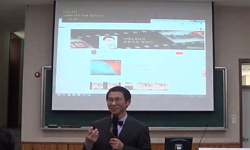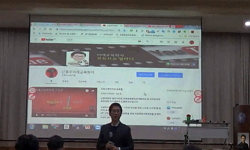본 논문은 우크라이나 전쟁 등 글로벌 생존적 위협이 고조되는 시대적 상황을 진단하고 4차 산업혁명이 미중 경쟁에 가지는 함의를 분석하기 위해 칼 마르크스의 사적 유물론(historical material...
http://chineseinput.net/에서 pinyin(병음)방식으로 중국어를 변환할 수 있습니다.
변환된 중국어를 복사하여 사용하시면 됩니다.
- 中文 을 입력하시려면 zhongwen을 입력하시고 space를누르시면됩니다.
- 北京 을 입력하시려면 beijing을 입력하시고 space를 누르시면 됩니다.

사적 유물론으로 본 4차 산업혁명: 미중 전략적 경쟁에 대한 시사점 = The Fourth Industrial Revolution from the Perspective of Historical Materialism: Implications for US-China Strategic Competition
한글로보기https://www.riss.kr/link?id=A108670036
- 저자
- 발행기관
- 학술지명
- 권호사항
-
발행연도
2023
-
작성언어
-
- 주제어
-
KDC
300
-
등재정보
KCI등재
-
자료형태
학술저널
- 발행기관 URL
-
수록면
75-90(16쪽)
- 제공처
-
0
상세조회 -
0
다운로드
부가정보
국문 초록 (Abstract)
본 논문은 우크라이나 전쟁 등 글로벌 생존적 위협이 고조되는 시대적 상황을 진단하고 4차 산업혁명이 미중 경쟁에 가지는 함의를 분석하기 위해 칼 마르크스의 사적 유물론(historical materialism)을 소환한다. 마르크스에 따르면 사적 유물론의 핵심 메시지는 생산력(productive forces)이 생산관계(production relations)를 결정하거나 경제적 토대(base)가 상부구조(superstructure)를 결정한다는 것이다. 다시 말해 “경제가 정치를 지배한다”는 말이다. 우리는 “왜 21세기에 사적 유물론을 이야기하는가?”라는 질문을 던질 수 있다. 이것은 마르크스주의의 분석적 방법론인 사적 유물론은 자본주의 사회가 붕괴할 것이라는 마르크스의 예측이 틀렸음에도 불구하고 현대 사회에 여전히 적용될 수 있기 때문이다. 이것은 특히 우리가 기술(생산력)과 거버넌스(생산 관계) 사이의 관계에 초점을 맞출 때 사실이다. 2장에서 생산력과 생산관계 및 상부구조의 각
구성요소가 1차에서 4차에 걸친 산업혁명의 진전에 따라 어떻게 바뀌는지를 차례로 살펴본다. 3장에서는 4차 산업혁명의 진전에 따라 심화되는 불평등과 양극화 해소 방안에 대해 살펴본다. 4장에서는 이상의 논의가 미중 전략적 경쟁에 대해 가지는 시사점을 알아본다. 5장은 결론으로 이상의 논의를 정리한다. 일반론적으로 말해서 불평등을 줄이고 동시에 성장을 유지하는 데 성공한 나라가 경쟁에서 이길 것이다. 적어도 그린수소를 중심으로 밑바닥으로부터의 에너지 혁명을 통해 경제적 불평등을 줄이고 성장을 유지하는 데 있어서 민주주의가 권위주의보다 유리하다. 20세기 3차 산업혁명 시대에 급변하는 기술 변화에 국가체제와 시스템을 제때에 변화시키지 못해 체제경쟁에서 패배한 구소련의 역사적 사례를 찾아볼 수 있다. 기술적인 측면에서 4차 산업혁명의 경쟁이나 기술 경쟁에서의 승자가 미중 경쟁에서의 승자가 될 것이라고 주장할 수 있다. 이를 사적 유물론의 관점에서 말하면 생산력과 생산관계, 또는 경제적 토대(시장)와 정치(민주주의 또는 권위주의) 사이의 효율적인 제도적 양립에 성공한 국가가 승자가 될 것이다.
다국어 초록 (Multilingual Abstract)
This paper summons Karl Marx’s historical materialism to diagnose the times when global survival threats, such as the Ukraine war, are escalating, and to analyze the implications of the 4th Industrial Revolution on the US-China competition. Accordin...
This paper summons Karl Marx’s historical materialism to diagnose the times when global survival threats, such as the Ukraine war, are escalating, and to analyze the implications of the 4th Industrial Revolution on the US-China competition. According to Marx, the central message of historical materialism is that either productive forces determine production relations or the economic base determines the superstructure. In other words, “economy dominates politics”. We might ask, “Why talk about historical materialism in the 21st century?” This is because historical materialism, the analytic method of Marxism, is still applicable to modern society, despite the fact that Marx’s prediction that capitalist society would collapse was incorrect. This is especially true when we focus on the relationship between technology (productive forces) and governance (production relations).
In Chapter 2, we examine in turn how each component of the productive forces, production relations, and the superstructure changes with the progress of the 1st to 4th industrial revolutions. In Chapter 3, we look at ways to resolve inequality and polarization that are deepening as the 4th industrial revolution progresses. Chapter 4 examines the implications of the discussion above for strategic competition between the
In the era of the 3rd industrial revolution in the 20th century, we can find a historical example of the former Soviet Union, which was defeated in systemic competition because it failed to change the national system in a timely manner against rapidly changing technological changes. In terms of technology, it can be argued that the winner in the fourth industrial revolution or technology competition will be the winner in the US-China competition. From the point of view of historical materialism, the winner will be the state that succeeds in an efficient institutional compatibility between productive forces and relations of production, or between the economic base (market) and politics (democracy or authoritarianism).
동일학술지(권/호) 다른 논문
-
A Review of Global Value Chain Research in Humanities and Social Sciences based on Knowledge Mapping
- 한국비교경제학회
- ( Ding Yi )
- 2023
- KCI등재
-
- 한국비교경제학회
- 이상윤 ( Sang Youn Lee )
- 2023
- KCI등재
-
점포 속성에 따른 수입 명품 브랜드 자산이 점포 충성도에 미치는 영향: 국내 3대 백화점을 중심으로
- 한국비교경제학회
- 김진욱 ( Kim Jinwook )
- 2023
- KCI등재
-
베이비부머 세대의 개인적 특성과 환경적 특성이 창업의지에 미치는 영향에 관한 연구
- 한국비교경제학회
- 정두식 ( Jung Doo Sig )
- 2023
- KCI등재




 KISS
KISS






